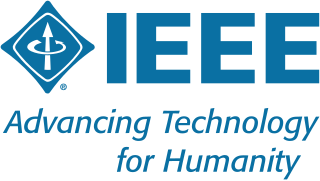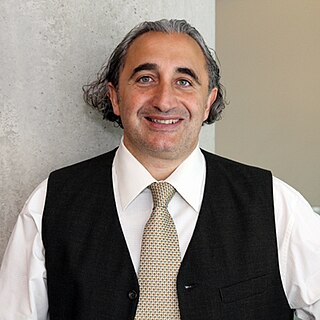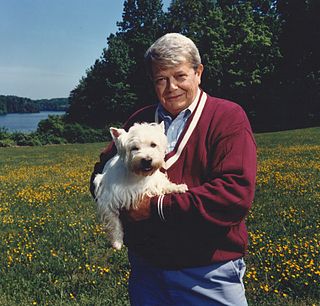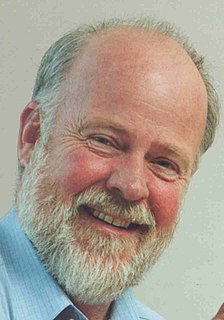The Association for Computing Machinery (ACM) is a US-based international learned society for computing. It was founded in 1947 and is the world's largest scientific and educational computing society. The ACM is a non-profit professional membership group, claiming nearly 100,000 student and professional members as of 2019. Its headquarters are in New York City.

Pollution is the introduction of contaminants into the natural environment that cause adverse change. Pollution can take the form of any substance or energy. Pollutants, the components of pollution, can be either foreign substances/energies or naturally occurring contaminants. Although environmental pollution can be caused by natural events, the word pollution generally implies that the contaminants have an anthropogenic source – that is, a source created by human activities. Pollution is often classed as point source or nonpoint source pollution. In 2015, pollution killed nine million people worldwide.

Science is a systematic enterprise that builds and organizes knowledge in the form of testable explanations and predictions about the universe.

The Institute of Electrical and Electronics Engineers (IEEE) is a 501(c)(3) professional association for electronic engineering and electrical engineering with its corporate office in New York City and its operations center in Piscataway, New Jersey. It was formed in 1963 from the amalgamation of the American Institute of Electrical Engineers and the Institute of Radio Engineers.

Jared Mason Diamond is an American geographer, historian, ornithologist, and author best known for his popular science books The Third Chimpanzee (1991); Guns, Germs, and Steel ; Collapse (2005), The World Until Yesterday (2012), and Upheaval (2019). Originally trained in biochemistry and physiology, Diamond is known for drawing from a variety of fields, including anthropology, ecology, geography, and evolutionary biology. He is a professor of geography at UCLA.
Robert Duncan Luce was an American mathematician and social scientist, and one of the most preeminent figures in the field of mathematical psychology. At the end of his life, he held the position of Distinguished Research Professor of Cognitive Science at the University of California, Irvine.

James Edward Maceo West is an American inventor and acoustician. He holds over 250 foreign and U.S. patents for the production and design of microphones and techniques for creating polymer foil electrets.
Affective science is the scientific study of emotion or affect. This includes the study of emotion elicitation, emotional experience and the recognition of emotions in others. Of particular relevance are the nature of feeling, mood, emotionally-driven behaviour, decision-making, attention and self-regulation, as well as the underlying physiology and neuroscience of the emotions.

The Psychonomic Society is one of the primary societies for general scientific experimental psychology in the United States. It is open to international researchers, and almost 40% of members are based outside of North America. Although open to all areas of experimental and cognitive psychology, its members typically study areas such as learning, memory, attention, motivation, perception, categorization, decision making, and psycholinguistics. Its name is taken from the word psychonomics, meaning "the science of the laws of the mind".

The New York Academy of Sciences was founded in January 1817 as the Lyceum of Natural History. It is the fourth oldest scientific society in the United States. An independent, nonprofit organization with more than 20,000 members in 100 countries, the academy has a mission to advance scientific research and knowledge, support scientific literacy, and promote science-based solutions to global challenges. The academy hosts programs and publishes scholarly scientific content in the life, physical, and social sciences, including several areas of cross-discipline inquiry such as nutrition, artificial intelligence, space exploration, and sustainability. The academy's programs and publications are designed to discuss and disseminate accurate and timely scientific information to its members, the broad scientific community, the media, and the public. The academy also provides professional and educational resources for researchers across all phases of their careers. The president and CEO of the academy is Nicholas Dirks. The chair of the board of governors is Jerry Hultin, chair and co-founder of Global Futures Group, LLC.
Lisa Feldman Barrett is a distinguished professor of psychology at Northeastern University, where she focuses on affective science. She is a director of the Interdisciplinary Affective Science Laboratory. Along with James Russell, she is the founding editor-in-chief of the journal Emotion Review. Along with James Gross, she founded the Society for Affective Science.

Gad Saad is a Lebanese-born Canadian Professor of Marketing at the John Molson School of Business at Concordia University who is known for applying evolutionary psychology to marketing and consumer behaviour. He also writes a blog for Psychology Today, and hosts a YouTube channel titled "The Saad Truth".

eBird is an online database of bird observations providing scientists, researchers and amateur naturalists with real-time data about bird distribution and abundance. Originally restricted to sightings from the Western Hemisphere, the project expanded to include New Zealand in 2008, and again expanded to cover the whole world in June 2010. eBird has been described as an ambitious example of enlisting amateurs to gather data on biodiversity for use in science.
Housing, or more generally, living spaces, refers to the construction and assigned usage of houses or buildings individually or collectively, for the purpose of shelter. Housing ensures that members of society have a place to live, whether it is a home or some other kind of dwelling, lodging or shelter. Many governments have one or more housing authorities, sometimes also called a housing ministry or housing department.

Howard Ensign Simmons Jr. was an American chemist with DuPont who discovered the Simmons–Smith reaction.

The American Journal of Respiratory and Critical Care Medicine is a biweekly peer-reviewed medical journal published by the American Thoracic Society. It covers the pathophysiology and treatment of diseases that affect the respiratory system, as well as topics of fundamental importance to the practice of pulmonary, critical care, and sleep medicine. It was established in March 1917 as the American Review of Tuberculosis. Since then there have been several title changes. In 1953 a subtitle was added, "A Journal of Pulmonary Diseases." In 1955 the title became the American Review of Tuberculosis and Pulmonary Diseases, and in 1959 the American Review of Respiratory Diseases. The journal obtained its current title in 1994.
John H. Sinfelt was an American chemical engineer whose research on catalytic reforming was responsible for the introduction of unleaded gasoline.

William Cecil Campbell is an Irish biologist and parasitologist with United States citizenship, known for his work in discovering a novel therapy against infections caused by roundworms, for which he was jointly awarded the 2015 Nobel Prize in Physiology or Medicine. He helped to discover a class of drugs called ivermectins, whose derivatives have been shown to have "extraordinary efficacy" in treating River blindness and Lymphatic filariasis, among other parasitic diseases affecting animals and humans. Campbell worked at the Merck Institute for Therapeutic Research 1957–1990, and is currently a research fellow emeritus at Drew University.

Grant Robert Sutherland is a retired Australian human geneticist and celebrated cytogeneticist. He was the Director, Department of Cytogenetics and Molecular Genetics, Adelaide Women's and Children's Hospital for 27 years (1975-2002), then became the Foundation Research Fellow there until 2007. He is an Emeritus Professor in the Departments of Paediatrics and Genetics at the University of Adelaide.

Aysha Akhtar is an American neurologist, public health specialist and animal ethicist. Akhtar is co-founder, CEO, and President of the Center for Contemporary Sciences. She is a US veteran.














